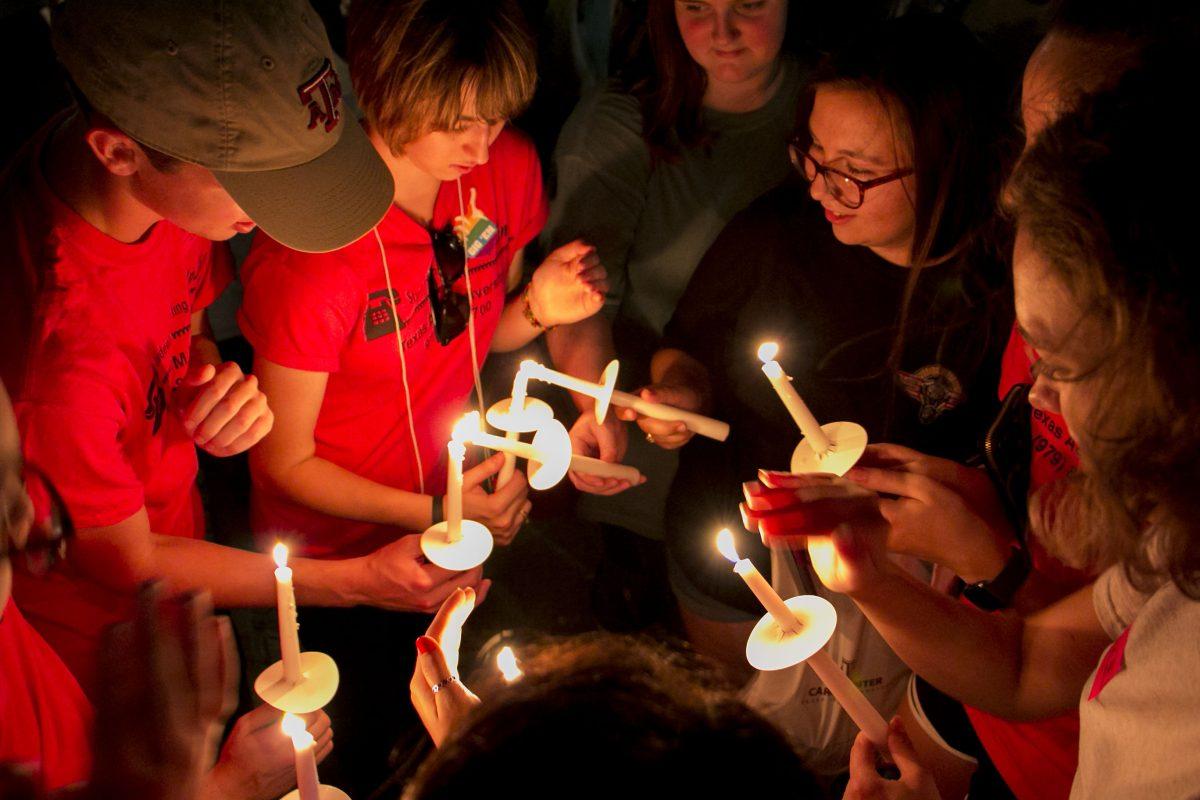The stigma that comes with discussing suicide and how to prevent it can often create a barrier, but Student Counseling Services displayed their determination to help students overcome this obstacle.
With the goal of raising awareness and showing support for those who struggle with mental health, The Suicide Awareness Walk was held on Sept. 19 from 7 p.m. to 9 p.m. in Rudder Plaza with hundreds in attendance to help end the stigma. There were a variety of tabling resources such as HelpLine, SARC, NAMI of Brazos Valley and more along with live music from The Great American Box Car Chorus.
Santana Simple, professional counselor and director of suicide prevention at Student Counseling Services, said the event’s three main goals were to show that people care, raise awareness and to emphasize that suicide prevention is an important part of campus.
“If there’s anyone on our campus that’s struggling, hopefully they’ll be able to see that people on this campus do care about them,” Simple said. “We want to raise awareness so that everyday people know that suicide is preventable, there is something that you can do, and so that’s why we have all the resource tables, all the information that’s going to be available because sometimes we feel stuck if we encounter someone that’s on our campus.”
HelpLine coordinator Susan Vavra said when the Student Counseling Services close, HelpLine can be reached at 979-845-2700 to talk out whatever a person may be feeling. In addition to advertising their services at the event, Vavra said HelpLine is recruiting for their next training in January.
“In addition to the counseling service, we have the after-hours component that’s the HelpLine, and we’re available whenever the counseling services [are] closed on weekends, in the middle of the night, when there might not be a counselor for someone to go to they can certainly dial our phone number,” said Vavra.
Simple said the hundreds of students who gathered together are a reflection of how important the issue is and emphasizes the necessity of services on campus.
“It seems like students are actually enjoying themselves and that just to me signifies that what we’re doing is really important and it matters,” Simple said.
Kristie Delagarza, licensed professional counselor and director of outreach for Student Counseling Services, said her passion is getting out on campus to provide information about student counseling services and mental health wellness.
“My job is to try to reach as many students as we can that would not come into the counseling service,” Delagarza said. “With this suicide walk today, I feel like it’s an important opportunity to be able to let students know that suicide is out there, it’s something we need to raise awareness to and it’s okay to ask about it.”
On average, 22 veterans commit suicide every day, according to Alyssa Knuth, Marine Corps veteran, president of Student Veterans Association and human resources development senior.
“It’s very near and dear to our hearts and it’s something that we want to show support because there is a high population of student veterans on campus and we want to be able to show support [and] solidarity for the cause,” Knuth said. “We try to provide that kind of atmosphere for veterans so they don’t feel alone and so it helps with their transition – that’s a big part of what our organization does, is provide that kind of assistance and transitioning in a group of like-minded people.”
While not every member of the LGBTQIA+ community will experience symptoms, Carrie Klemt, psychologist I at Student Counseling Services, said the LGBTQIA+ community are at higher risk for mental health symptoms due to the general stress of being a minority member. Klemt said A&M’s counselling services is an affirmative counseling center, which means they welcome members of the LGBTQIA+ community.
“Although not every member of the LGBTQIA+ community will experience symptoms of depression or anxiety it’s really important for everyone to be aware that there is an elevated risk,” Klemt said. “This is especially critical with regard to suicide risk. The coming out process can have a lot of stressors and people may lose certain social support or other resources that they had before they came out those losses might make depression symptoms worse, especially when folks who are coming out don’t feel like they have anyone or anything to turn to.”
Rachel Hoyle, science and technology journalism master’s student Ph.D. candidate, said she came to the suicide awareness walk because she lost her brother to suicide three years ago.
“I’ve just been really looking for ways to remember him and connect with other people who have lost someone who have experienced a similar loss,” Hoyle said. “I’m really just empowered to see how many people came out and really care about this.”
Students can find more resources and sign up for suicide prevention training at scs.tamu.edu.










